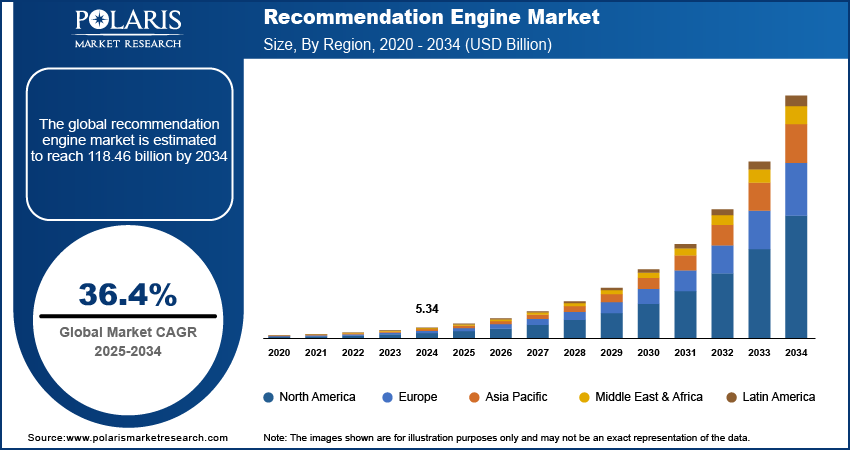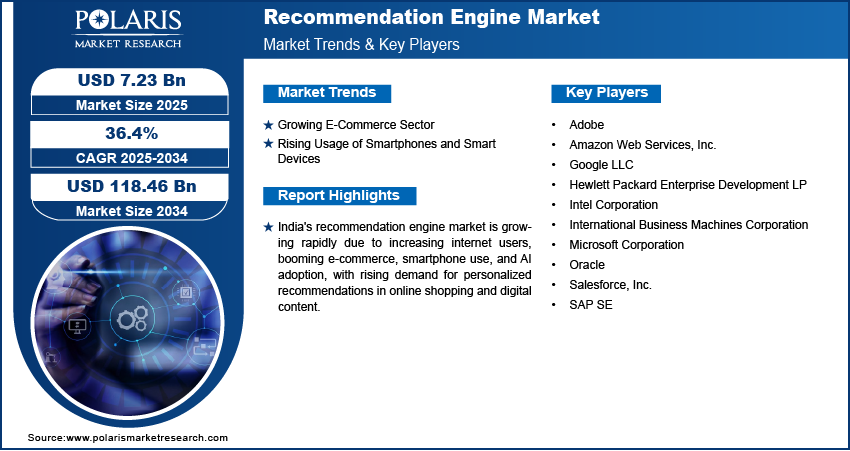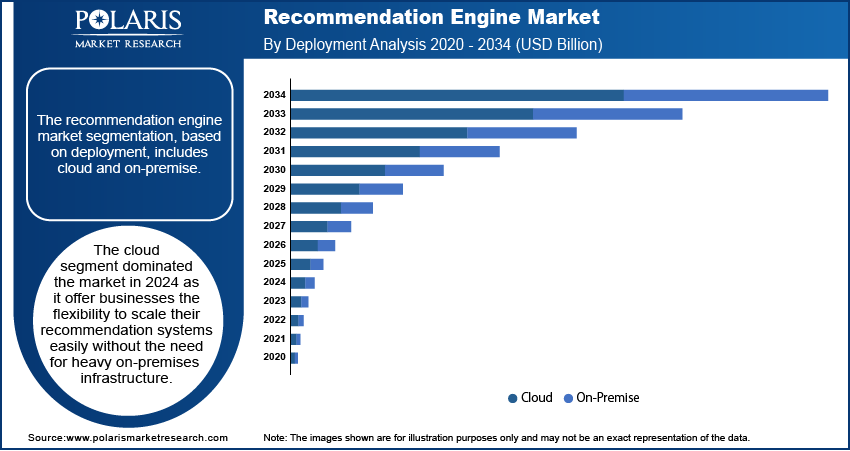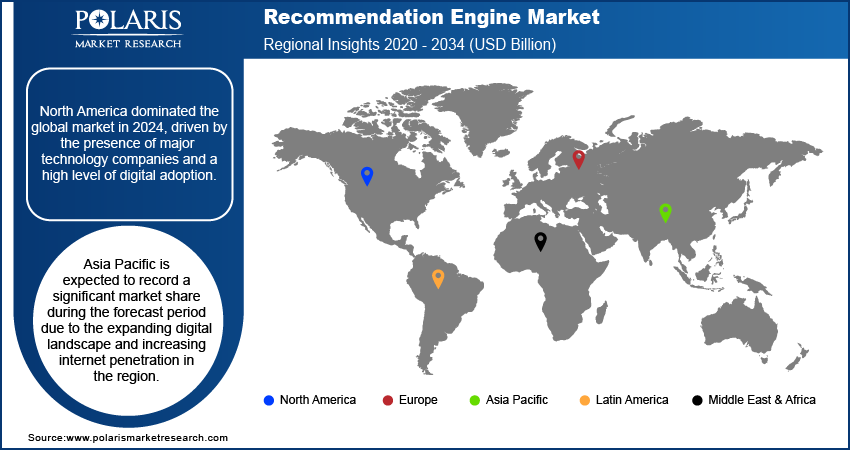
Recommendation Engine Market Size, Share, Trends, Industry Analysis Report: By Type, Deployment (Cloud and On-Premise), Organization, Application, End User, and Region (North America, Europe, Asia Pacific, Latin America, and Middle East & Africa) – Market Forecast, 2025–2034
- Published Date:Apr-2025
- Pages: 125
- Format: PDF
- Report ID: PM5491
- Base Year: 2024
- Historical Data: 2020-2023
Recommendation Engine Market Overview
The global recommendation engine market size was valued at USD 5.34 billion in 2024. The market is projected to grow from USD 7.23 billion in 2025 to USD 118.46 billion by 2034, exhibiting a CAGR of 36.4% from 2025 to 2034.
A recommendation engine is a system designed to suggest products, services, or content to users based on their preferences, behaviors, or interests. It uses algorithms to analyze data and predict what users might like or need next.
Rapid advancements in artificial intelligence (AI) and machine learning (ML) are driving improvements in recommendation engines. These technologies enable systems to better understand user behavior and preferences, making recommendations more accurate and relevant. AI processes large amounts of data and predicts what a user might like next based on patterns and trends. As AI and ML algorithms continue to improve, the recommendations become increasingly sophisticated, delivering more precise results. This makes it easier for businesses to offer highly customized experiences, leading to better engagement and higher satisfaction, thereby fueling the demand for recommendation engines.

To Understand More About this Research: Request a Free Sample Report
Businesses are increasingly adopting personalized experiences to target specific users across various aspects of their lives, such as shopping, watching movies, or browsing online. Recommendation engines enable businesses to suggest products, services, or content that align with individual preferences, interests, and behaviors. This level of personalization has become a factor in driving customer satisfaction, prompting companies to implement recommendation systems to meet these rising expectations. By offering tailored options, businesses can boost user engagement, strengthen brand loyalty, and enhance the overall customer experience. This, in turn, is driving the recommendation engine market demand.
Recommendation Engine Market Dynamics
Growing E-Commerce Sector
The rapid growth of e-commerce and online retail has made recommendation engines essential tools for businesses looking to stand out and boost sales. For instance, according to the Government of India Economic Survey, the e-commerce market in India was valued at USD 83 billion in 2023, highlighting the rapid sector’s rapid expansion. Online shopping exposes customers to a vast array of products, and without a way to filter and recommend relevant items, users can easily feel overwhelmed. To address this, businesses are increasingly adopting recommendation engines that analyze browsing history, past purchases, and user behavior to suggest products that are more likely to interest the individual, thereby driving the recommendation engine market revenue.
Rising Usage of Smartphones and Smart Devices
The increasing adoption of smartphones and smart technology into daily life has led to a surge in demand for recommendation engines. According to the Indian Ministry of Statistics and Programme Implementation, in India alone, 96.1% of the country’s population in the 16-24 age group uses smartphones, highlighting the growing number of smartphone users. Mobile apps and smart devices, such as smart speakers, collect and analyze user preferences in real time, offering personalized recommendations wherever the user goes. As the reliance on smartphones and smart devices for convenience and entertainment continues to grow, businesses are increasingly adopting recommendation engines, further driving the recommendation engine market expansion.

Recommendation Engine Market Segment Insights
Recommendation Engine Market Assessment by Type Outlook
The recommendation engine market assessment, based on type, includes collaborative filtering, content based filtering, and hybrid recommendation. The collaborative filtering segment is expected to witness the fastest growth from 2025 to 2034. Collaborative filtering works by analyzing user behavior, preferences, and interactions with products or content to recommend similar items based on what other users with similar tastes have liked. This approach is highly effective, as it provides personalized suggestions without requiring detailed knowledge about the user’s preferences. Its ability to offer relevant recommendations based on collective user data is driving its adoption across industries such as e-commerce, entertainment, and online services, contributing to the segment’s robust growth in the recommendation engine market.
Recommendation Engine Market Evaluation by Deployment Outlook
The recommendation engine market evaluation, based on deployment, includes cloud and on-premise. The cloud segment dominated the recommendation engine market in 2024. Cloud-based solutions offer businesses the flexibility to scale their recommendation systems easily without the need for heavy on-premises infrastructure. These solutions allow for faster updates, real-time processing, and lower maintenance costs. Additionally, the cloud provides businesses with access to vast computational power and data storage, enhancing the performance of recommendation engines. More companies are moving to cloud platforms for efficiency and cost-effectiveness, thereby driving segmental growth in the recommendation engine market.

Recommendation Engine Market Regional Analysis
By region, the study provides the recommendation engine market insights into North America, Europe, Asia Pacific, Latin America, and the Middle East & Africa. North America dominated the global market in 2024, driven by the presence of major technology companies and a high level of digital adoption. The region is home to leading e-commerce platforms, streaming services, and tech giants that actively implement advanced recommendation systems to personalize user experiences. Additionally, the rapid growth of cloud computing, AI, and ML technologies is improving the effectiveness of recommendation engines in North America. These factors collectively contribute to the regional market dominance.

The Asia Pacific recommendation engine market is expected to record a significant market share during the forecast period, driven by the expanding digital landscape and increasing internet penetration. For instance, according to the Indian Ministry of Statistics and Programme Implementation, 82.8% of the 15-29 age group in India has access to the Internet. Countries such as China, Japan, and India are leading the adoption of recommendation systems across e-commerce, entertainment, and online services. The region’s large population and diverse consumer base create vast opportunities for personalized recommendations, especially in retail and content streaming. Additionally, the growing use of mobile devices and AI technologies is driving the adoption of recommendation engines, thereby contributing to the regional market growth.
The India recommendation engine market is experiencing substantial growth driven by the increasing number of internet users and the country’s booming e-commerce sector. Businesses are leveraging recommendation engines to improve user experiences and improve customer engagement. Additionally, the rise of streaming platforms and digital content consumption is driving the adoption of recommendation systems, thereby driving the market growth in India.
Recommendation Engine Market – Key Players and Competitive Insights
The recommendation engine market is constantly evolving, with numerous companies striving to innovate and distinguish themselves. Leading global corporations dominate the market by leveraging extensive research and development, and advanced techniques. These companies pursue strategic initiatives such as mergers and acquisitions, partnerships, and collaborations to enhance their product offerings and expand into new markets.
New companies are impacting the market by introducing innovative products to meet the demand of specific market sectors. This competitive environment is amplified by continuous progress in product offerings. Major players in the recommendation engine market include Adobe; Amazon Web Services, Inc.; Google LLC; Hewlett Packard Enterprise Development LP; Intel Corporation; International Business Machines Corporation; Microsoft Corporation; Oracle; Salesforce, Inc.; and SAP SE.
Microsoft is a multinational technology company headquartered in Redmond, Washington. It offers a wide range of products and services, including operating systems, productivity software, gaming consoles, and cloud-based solutions. Its flagship product, Microsoft Windows, is the world's most widely used operating system. Other popular products include Microsoft Office, Skype, and the Xbox gaming console. In recent years, Microsoft has invested heavily in AI and ML technologies. The company uses AI to improve its products and services while developing new AI-based applications. For instance, Microsoft's Cortana virtual assistant uses ML to provide personalized recommendations and insights to users. Microsoft has also developed several AI-based products and services, including the Azure Machine Learning platform, which allows developers to build, deploy, and manage ML models at scale. Microsoft has also applied AI to healthcare, with tools like the Microsoft Healthcare Bot, which helps patients get answers to their health-related questions. The company is actively involved in AI research and development and has established partnerships with leading universities and research institutions worldwide. The company is committed to using AI to solve the world's most pressing problems, such as climate change, healthcare, and education. Microsoft provides recommendation engines through the Azure Recommendation API, which generates cached recommendations for a subscription by invoking generateRecommendations.
International Business Machines Corporation (IBM) is an American multinational technology company operating in over 75 countries. IBM Watson, which was launched in 2010, is a supercomputer that uses Digital Workplace (AI) and advanced analytical tools to function as a "question-answering" machine. For businesses and organizations, IBM Watson leverages Digital Workplace to optimize employees' time, automate complex processes, and predict future outcomes. IBM also offers the Watsonx recommendation engine, an AI product portfolio designed to accelerate the impact of AI on core workflows, thereby boosting productivity. Watsonx offers flexibility with open-source and custom models across any cloud, ensures responsible AI through trusted data and governance, and enables quick deployment with minimal disruption.
List of Key Companies in Recommendation Engine Market
- Adobe
- Amazon Web Services, Inc.
- Google LLC
- Hewlett Packard Enterprise Development LP
- Intel Corporation
- International Business Machines Corporation
- Microsoft Corporation
- Oracle
- Salesforce, Inc.
- SAP SE
Recommendation Egnine Industry Developments:
In January 2024, Arthur's Recommender System Support was launched, enhancing AI-driven recommendation engines. This tool improved customer satisfaction and revenue growth for online businesses by monitoring and optimizing recommender system performance.
Recommendation Engine Market Segmentation
By Type Outlook (Revenue, USD Billion, 2020–2034)
- Collaborative Filtering
- Content Based Filtering
- Hybrid Recommendation
By Deployment Outlook (Revenue, USD Billion, 2020–2034)
- Cloud
- On-Premise
By Organization Outlook (Revenue, USD Billion, 2020–2034)
- SMEs
- Large Enterprises
By Application Outlook (Revenue, USD Billion, 2020–2034)
- Personalized Campaigns and Customer Delivery
- Strategy Operations and Planning
- Product Planning and Proactive Asset Management
By End User Outlook (Revenue, USD Billion, 2020–2034)
- Information Technology
- Healthcare
- Retail
- BFSI
- Media & Entertainment
- Others
By Regional Outlook (Revenue, USD Billion, 2020–2034)
- North America
- US
- Canada
- Europe
- Germany
- France
- UK
- Italy
- Spain
- Netherlands
- Russia
- Rest of Europe
- Asia Pacific
- China
- Japan
- India
- Malaysia
- South Korea
- Indonesia
- Australia
- Rest of Asia Pacific
- Middle East & Africa
- Saudi Arabia
- UAE
- Israel
- South Africa
- Rest of Middle East & Africa
- Latin America
- Mexico
- Brazil
- Argentina
- Rest of Latin America
Recommendation Engine Market Report Scope
|
Report Attributes |
Details |
|
Market size value in 2024 |
USD 5.34 billion |
|
Market size value in 2025 |
USD 7.23 billion |
|
Revenue Forecast by 2034 |
USD 118.46 billion |
|
CAGR |
36.4% from 2025–2034 |
|
Base year |
2024 |
|
Historical Data |
2020–2023 |
|
Forecast Period |
2025–2034 |
|
Quantitative Units |
Revenue in USD billion and CAGR from 2025 to 2034 |
|
Report Coverage |
Revenue Forecast, Market Competitive Landscape, Growth Factors, and Trends |
|
Segments Covered |
|
|
Regional Scope |
|
|
Competitive Landscape |
|
|
Report Format |
|
|
Customization |
Report customization as per your requirements with respect to countries, regions, and segmentation. |
FAQ's
The recommendation engine market size was valued at USD 5.34 billion in 2024 and is projected to grow to USD 118.46 billion by 2034.
The global market is projected to register a CAGR of 36.4% from 2025 to 2034.
North America had the largest share of the global market in 2024.
A few of the key players in the market are Adobe; Amazon Web Services, Inc.; Google LLC; Hewlett Packard Enterprise Development LP; Intel Corporation; International Business Machines Corporation; Microsoft Corporation; Oracle; Salesforce, Inc.; and SAP SE.
The cloud segment dominated the market in 2024 as it offer businesses the flexibility to scale their recommendation systems easily without the need for heavy on-premises infrastructure.
The collaborative filtering segment is expected to witness the fastest growth during the forecast period due to its ability to offer relevant recommendations based on collective user data.
